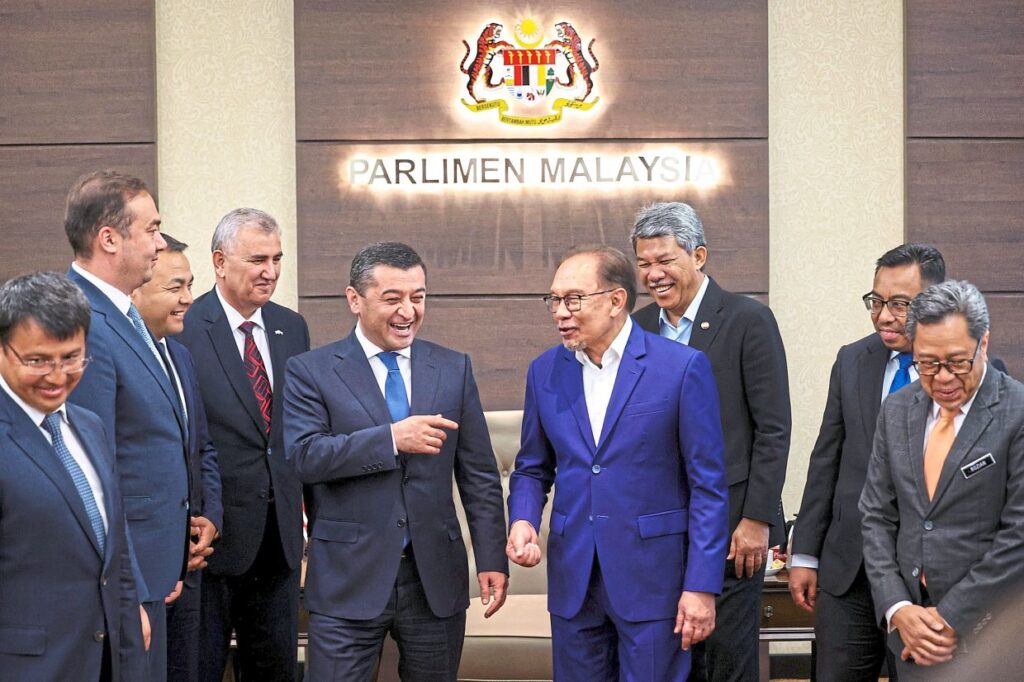Malaysia Weighs Joining BRICS to Strengthen Economic Ties: PM Anwar Ibrahim
Contextualizing Malaysia’s Strategic Move Amid Global Economic Shifts
KUALA LUMPUR — Malaysian Prime Minister Datuk Seri Anwar Ibrahim has revealed that the country is considering joining the BRICS group, following extensive studies on the potential benefits and implications. The Prime Minister made this announcement during a parliamentary session, in response to a query from Datuk Seri Doris Sophia Brodi, Member of Parliament for Seri Aman, regarding the thoroughness of the government’s investigation into this strategic decision.
BRICS: A Rising Force in the Global Economy
BRICS, originally comprising Brazil, Russia, India, and China, was formed in 2009 as a coalition aiming to promote economic, political, and cultural cooperation among emerging economies. South Africa joined the group in 2010, broadening its reach and influence. Recently, in January of this year, BRICS expanded yet again to include Iran, Egypt, Ethiopia, and the United Arab Emirates (UAE), further solidifying its position as a significant bloc within global economic structures.
Malaysia’s Motivation for Considering BRICS Membership
Anwar emphasized that Malaysia’s core priorities are strengthening its trade relations, enhancing economic growth, and expanding its global economic network. These efforts aim to bring tangible benefits to Malaysian traders, the business sector, and investors. Given Malaysia’s status as a trading nation, the Prime Minister noted the strategic importance of opening up new economic spaces and securing its position within the Global South – a term often used to describe developing and emerging economies.
Weighing the Implications
In response to concerns about the disparate economic, political, and social contexts among BRICS member countries, Anwar assured that the Malaysian government has thoroughly examined these factors. He pointed out that other significant economic groups, such as the Asia-Pacific Economic Cooperation (APEC) and the Organisation for Economic Co-operation and Development (OECD), also include diverse member nations, many of which are part of BRICS as well.
The Prime Minister’s commitment to maintaining strong ties with existing regional and global economic frameworks was clear. Malaysia remains engaged with APEC and continues to participate actively in the Regional Comprehensive Economic Partnership (RCEP) and the Comprehensive and Progressive Agreement for Trans-Pacific Partnership (CPTPP), which involve leading economies across Asia and the Pacific.
Strategic and Diplomatic Balancing
Anwar took care to clarify that Malaysia’s potential BRICS membership would not entail meddling in the domestic or political affairs of other member countries. Malaysia’s foreign policy has always advocated for a balanced approach, maintaining independent stances on key issues, such as its longstanding position on the Gaza conflict.
Despite differing viewpoints with various Western nations and within international organizations like the World Trade Organization (WTO), Malaysia prioritizes its trade relationships. Anwar affirmed that these differences do not lead to severed ties but underscore the importance of maintaining robust diplomatic and economic connections globally.
Meeting of Minds
The Prime Minister shared insights from his recent engagement with Uzbekistan’s Minister of Foreign Affairs, Bakhtiyor Saidov, emphasizing the importance of fostering new and existing diplomatic and trade relationships. The meeting, also attended by Malaysia’s Foreign Minister Datuk Seri Mohamad Hasan, highlighted Malaysia’s active role in global diplomacy.
Conclusion
As Malaysia contemplates joining BRICS, the government aims to strategically position itself within a diversified economic network, promoting growth and stability for its economy and people. The move, reflecting a broader shift in global economic alliances, presents both opportunities and challenges that Malaysia is prepared to navigate under the steady leadership of Prime Minister Anwar Ibrahim.
For more information on Malaysia’s economic strategies and foreign policies, visit the official website.
This article contextualizes Malaysia’s potential BRICS membership within recent global economic shifts and the country’s strategic priorities.
